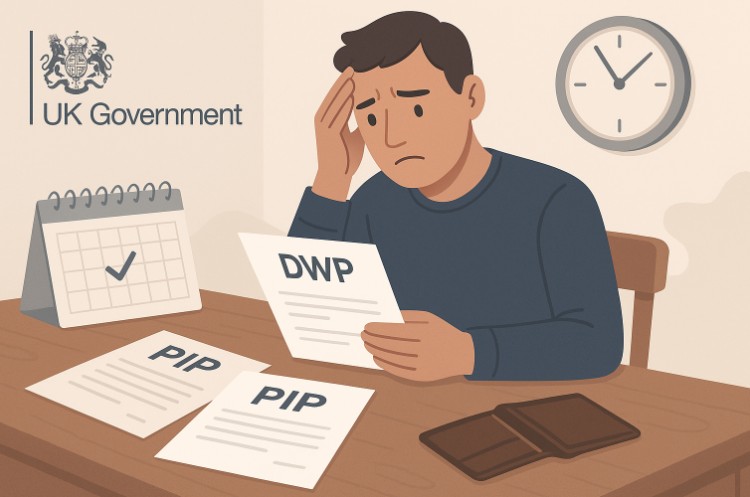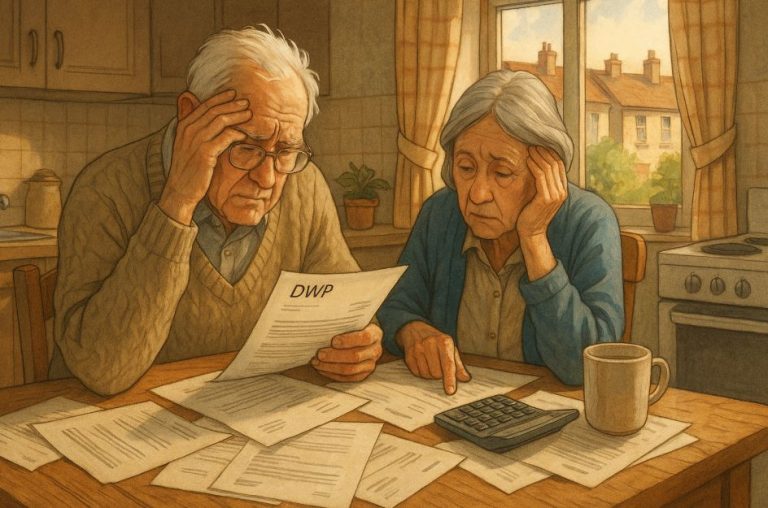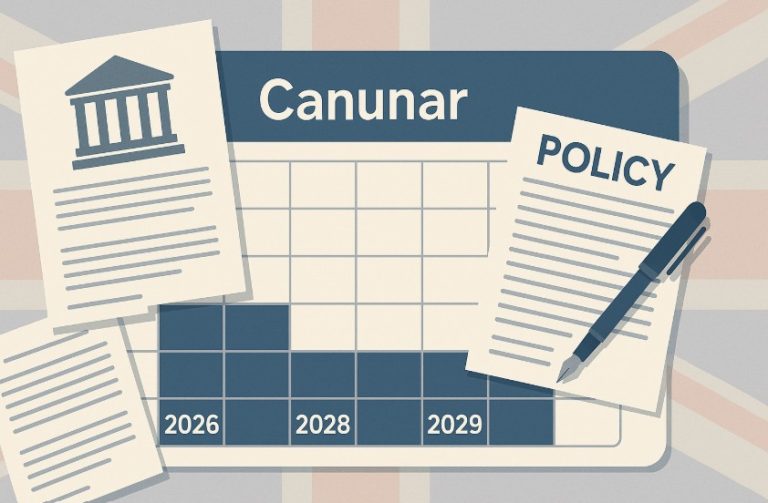Universal Credit is one of the most widely claimed benefits in the United Kingdom, yet confusion often surrounds its tax status.
Many individuals receiving or considering Universal Credit ask, “Is Universal Credit taxable?” This guide provides a detailed, professional breakdown of the tax implications of Universal Credit, ensuring that UK residents understand where they stand financially and legally when receiving this government support.
What Is Universal Credit and How Does It Work?

Universal Credit is a monthly payment provided to individuals or households in the UK to help with living costs.
It was introduced to simplify the benefits system by merging six previously separate benefits into one, including Income Support, Housing Benefit, and Working Tax Credit.
This system aims to make it easier for claimants to understand what they are entitled to and how their income affects their benefits.
Universal Credit is calculated based on income, savings, and household circumstances. Payments are made once a month directly into a bank account.
The amount received can change each month depending on reported changes such as starting a new job, a change in rent, or adding a child to the household.
Claimants are expected to manage their accounts online through the Universal Credit portal, where they can report changes and view upcoming payments.
The benefit is intended to incentivise work by ensuring that taking on a job or working more hours always increases income.
Is Universal Credit Considered Taxable Income in the UK?
Universal Credit is not treated as taxable income. According to HM Revenue and Customs (HMRC), it is classed as a non-taxable state benefit.
This means individuals who receive Universal Credit do not pay income tax on it and it does not contribute to their overall tax liability.
This classification remains consistent regardless of the amount received or the specific elements included in the Universal Credit payment. Whether the recipient is unemployed or working, the benefit itself is exempt from taxation.
Universal Credit is also not included in taxable earnings for purposes such as PAYE or Self Assessment tax returns unless other taxable income is involved.
This makes it distinct from other forms of support like contribution-based Jobseeker’s Allowance or the State Pension, which are taxable.
How Do HMRC and DWP Treat Universal Credit Payments?
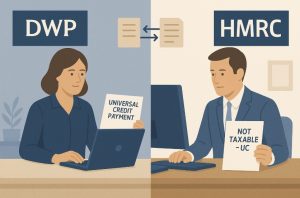
Understanding how Universal Credit is handled by HM Revenue and Customs (HMRC) and the Department for Work and Pensions (DWP) is crucial for anyone receiving this benefit or planning to apply for it.
While both bodies are part of the UK government and deal with financial matters, their roles in relation to Universal Credit are clearly defined and fundamentally different.
Role of the Department for Work and Pensions (DWP)
The DWP is the primary department responsible for the administration and distribution of Universal Credit.
It oversees the entire process from application to payment and ensures that claimants receive the correct amount based on their individual or household circumstances.
This includes assessing eligibility, calculating entitlements, and adjusting payments in response to reported changes.
When someone applies for Universal Credit, the DWP uses the data provided to determine whether the applicant qualifies and how much they should receive. The amount is influenced by various factors, including:
- Income and earnings (from employment or self-employment)
- Rent and housing costs
- Childcare costs
- Disability or health conditions
- Number of dependents
Once the DWP processes this information, it pays the Universal Credit directly into the claimant’s bank account each month.
It is also responsible for requesting additional information or evidence if needed, conducting assessments, and managing sanctions or overpayments where necessary.
Role of HM Revenue and Customs (HMRC)
While HMRC handles the collection of taxes and the administration of taxable benefits, it does not treat Universal Credit as a taxable form of income.
Universal Credit is not considered part of a person’s income for tax purposes, meaning it does not appear on PAYE records, P60s, or P45s. It is not included in the calculation of income tax liability or National Insurance contributions.
However, HMRC plays an indirect role in relation to Universal Credit in a few important ways:
- Sharing Income Information: HMRC and the DWP have a data-sharing agreement in place. This allows the DWP to access real-time information from HMRC about a claimant’s employment income through the Real Time Information (RTI) system. This integration enables the DWP to adjust Universal Credit payments automatically when a person’s income changes from month to month.
- Tax Credit Transitions: For people moving from legacy benefits such as Working Tax Credit or Child Tax Credit to Universal Credit, HMRC’s records are used to help transition claimants to the new system. Once moved to Universal Credit, the benefit is entirely managed by the DWP.
- Self Assessment Cases: If a person is self-employed and required to complete a Self Assessment tax return, they must declare their business income to HMRC. While Universal Credit itself does not need to be declared, the earnings reported to HMRC will influence how much Universal Credit the person receives. HMRC’s assessment of taxable income helps the DWP understand how earnings affect benefit entitlement.
Clarity Between Taxable and Non-Taxable Benefits
It is essential to distinguish between benefits that are taxed by HMRC and those that are not. Contribution-based benefits such as the State Pension or contributory Jobseeker’s Allowance are considered taxable and must be reported to HMRC. In contrast, Universal Credit is entirely excluded from taxable income.
This separation ensures that individuals do not mistakenly include Universal Credit in their tax returns or assume they owe income tax on it.
Any correspondence from HMRC about taxes owed will not include Universal Credit figures, nor will these payments impact a person’s tax code or PAYE deductions.
Summary of Key Differences:
Here’s a breakdown of how HMRC and DWP treat Universal Credit:
| Aspect | HMRC | DWP |
| Responsibility for Payments | Not involved | Issues Universal Credit payments |
| Taxation Status | Not taxable; excluded from income tax | Calculated as a non-taxable benefit |
| Use of Income Data | Shares RTI data with DWP | Uses RTI data to adjust monthly payment |
| Inclusion in Tax Returns | Not required (unless specified) | May request income data to reassess entitlement |
| Handling of Overpayments | Not applicable | Manages repayment plans or deductions |
| Interaction with Other Benefits | Transitions from tax credits if needed | Coordinates UC with other DWP-administered benefits |
Understanding this structure helps claimants know where to go for assistance or clarification. If the issue concerns how much Universal Credit is paid, or whether a change in circumstances has been applied correctly, the DWP is the point of contact.
If the issue is related to tax codes, Self Assessment, or taxable income from work or business, HMRC should be contacted.
In short, Universal Credit is administered entirely by the DWP and does not fall within HMRC’s scope for taxation, though income reported to HMRC may influence the amount received.
Do You Need to Declare Universal Credit on Your Tax Return?
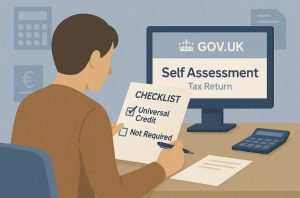
In general, claimants do not need to declare Universal Credit on a Self Assessment tax return. Since it is a non-taxable benefit, it does not need to be included when calculating income tax or completing the annual tax return process.
However, if the individual is self-employed or earns other forms of taxable income, they must still complete a Self Assessment.
In these cases, only the business income or additional taxable earnings must be reported. The Universal Credit amount does not need to be included in the total income figure submitted to HMRC.
There are instances where Universal Credit figures may be mentioned in other contexts, such as when applying for a mortgage or financial assessment.
In these scenarios, the benefit may be included in the income breakdown for affordability assessments, but it does not affect personal tax liability.
Are There Any Parts of Universal Credit That Are Taxable?
Universal Credit is composed of several components designed to address different financial needs. These components are:
- Standard monthly allowance
- Housing element
- Childcare element
- Carer element
- Limited Capability for Work or Work-Related Activity component
None of these individual parts are taxable. Whether you receive Universal Credit due to low income, housing costs, children, disability, or caring responsibilities, none of the funds you receive are subject to income tax.
This remains true regardless of whether your Universal Credit increases due to a change in circumstances.
For example, if a person starts receiving additional support for a disabled child, the increased payment is still non-taxable.
The clear classification of all Universal Credit elements as tax-free simplifies financial planning for claimants.
What Are the Tax Implications If You Have Other Sources of Income?
Although Universal Credit is tax-free, other income streams may affect both taxation and the Universal Credit entitlement.
This includes income from employment, self-employment, pensions, or rental income. These earnings are taxable and may reduce the amount of Universal Credit received each month.
If you earn above a certain threshold, your Universal Credit payments may decrease. This interaction is part of the taper system used by the DWP, which reduces benefits based on earnings.
The table below shows a comparison between common income types and their treatment in terms of taxation and Universal Credit impact:
| Income Source | Taxable by HMRC | Affects UC Entitlement |
| Universal Credit | No | N/A |
| Employment Income | Yes | Yes |
| Self-Employment Income | Yes | Yes |
| Rental Income | Yes | Yes |
| State Pension | Yes | Yes |
| Personal Savings (Interest) | Yes (over threshold) | Yes |
This information highlights that while Universal Credit remains tax-free, recipients must still be mindful of how their other income streams interact with both HMRC and the DWP.
How Does Universal Credit Compare with Other Taxable and Non-Taxable Benefits?
The UK welfare system includes a range of benefits, some of which are taxable while others are not. Knowing which category a benefit falls into is important for accurate tax planning.
The table below compares Universal Credit with several other commonly claimed benefits:
| Benefit Name | Taxable? | Administered By | Notes |
| Universal Credit | No | Department for Work and Pensions (DWP) | Paid monthly, means-tested |
| Contribution-Based Jobseeker’s Allowance | Yes | DWP | Taxable income if claimed for over 6 months |
| Income-Based Jobseeker’s Allowance | No | DWP | Replaced by Universal Credit in many areas |
| Employment and Support Allowance (ESA) | Depends | DWP | Contribution-based ESA is taxable |
| Housing Benefit | No | Local Authority | Not included in taxable income |
| Child Benefit | No (but high income tax charge applies) | HMRC | Tax charge if income > £50,000 |
| Personal Independence Payment (PIP) | No | DWP | Non-means-tested, tax-free |
This table clarifies that while some benefits such as JSA or ESA may be taxable in certain forms, Universal Credit remains consistently tax-free across all claim scenarios.
What Should You Know About Reporting Changes in Income or Circumstances?
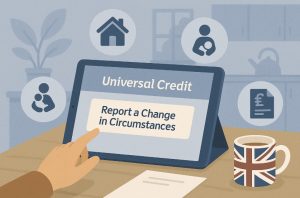
Universal Credit is a responsive benefit, meaning it adjusts to reflect real-time changes in a claimant’s situation.
Because of this, it is essential that recipients report changes promptly to avoid overpayments or underpayments.
Important changes that must be reported include:
- Starting or ending a job
- Changes in salary or working hours
- Moving home or changes in rent
- Birth or adoption of a child
- Relationship changes such as separation or marriage
Failure to report such changes may result in incorrect payment amounts. In some cases, this can lead to overpayment that must be repaid, or penalties if the omission is deemed intentional.
The DWP uses the information provided to adjust benefit amounts and apply the appropriate work allowance and taper rate. This ensures payments are in line with current needs and income levels.
What Are Common Misconceptions About Universal Credit and Tax?
There is considerable confusion surrounding Universal Credit, particularly regarding whether it is taxed. This confusion may stem from the fact that some other government benefits are taxable.
Common misconceptions include:
- Universal Credit becomes taxable if income exceeds a certain threshold. This is false. While high income may reduce benefit amounts, it does not make the benefit itself taxable.
- Universal Credit must be declared on tax returns. In most cases, it does not need to be included unless specifically requested by another body or for particular financial assessments.
- People receiving Universal Credit while working will be taxed on the benefit. In reality, only the employment income is taxed. Universal Credit remains non-taxable regardless of employment status.
Understanding these misconceptions is key to managing both tax affairs and benefit entitlements responsibly.
Conclusion
Yes, Universal Credit is completely tax-free. It does not count as taxable income and does not need to be included on most tax returns.
While other income streams may affect your overall tax position, your Universal Credit payments remain unaffected by income tax.
Claimants should focus on keeping their information up to date with DWP and understanding how their additional earnings interact with both HMRC and their UC payments.
Awareness and accurate reporting are key to managing both your tax obligations and benefit entitlements effectively.
Frequently Asked Questions
Can Universal Credit reduce my tax refund?
No, Universal Credit is not taxable and does not impact your tax refund from employment or self-employment income.
Do I pay tax if I receive Universal Credit while working?
You may pay tax on your earnings, but not on the Universal Credit. Only income above your personal allowance is taxed.
Is Universal Credit included in my annual income statement?
It is not included in P60s or P45s as it is issued by DWP, not your employer, and it is not taxable.
Do I report Universal Credit if I’m self-employed?
Only your business income must be reported. Universal Credit is not declared as taxable income on your Self Assessment.
Can Universal Credit affect my tax code?
No. Your tax code is determined by HMRC based on your taxable income, not your benefit entitlements.
What happens if I don’t report income changes while on Universal Credit?
Failing to report can lead to overpayments, penalties, and in some cases, benefit suspension or investigation.
Is Housing Benefit taxable like Universal Credit?
No. Like Universal Credit, Housing Benefit is also non-taxable and does not need to be declared to HMRC.


